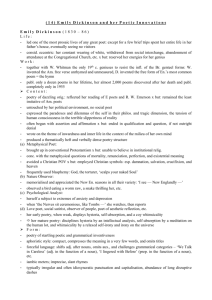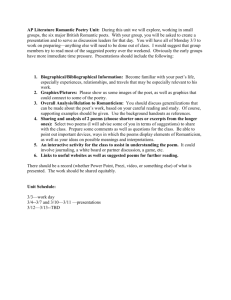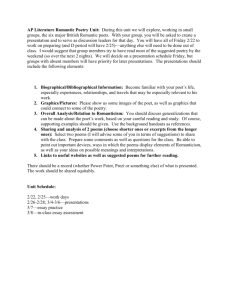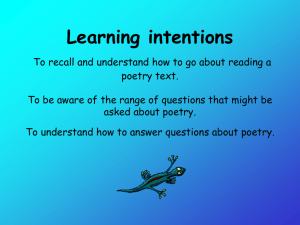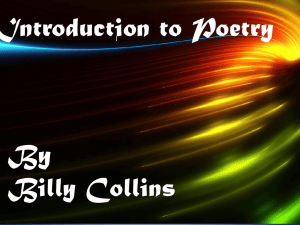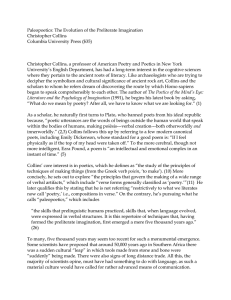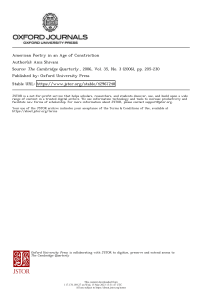Billy Collins - PreIB-MrsO
advertisement
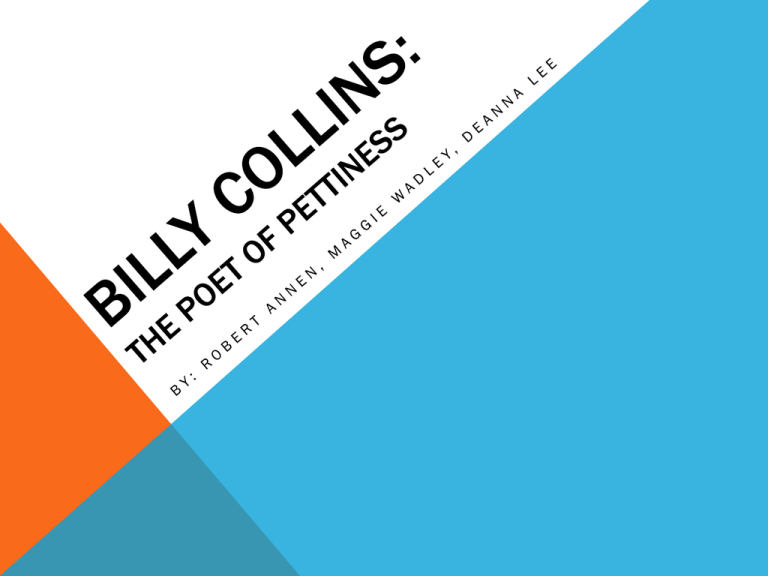
INFORMATION • • • • • • • • • Born March 22, 1941 in New York, New York Only child Dad- William Collins – Electrician Mom- Katherine Collins– Nurse Attended parochial schools Married Diane Radio appearance Lots of Catholic Schooling Popularity boosted because publisher argument “THE ART OF DROWNING” I wonder how it all got started, this business about seeing your life flash before your eyes while you drown, as if panic, or the act of submergence, could startle time into such compression, crushing decades in the vice of your desperate, final seconds. After falling off a steamship or being swept away in a rush of floodwaters, wouldn't you hope for a more leisurely review, an invisible hand turning the pages of an album of photographsyou up on a pony or blowing out candles in a conic hat. How about a short animated film, a slide presentation? Your life expressed in an essay, or in one model photograph? Wouldn't any form be better than this sudden flash? Your whole existence going off in your face in an eyebrow-singeing explosion of biographynothing like the three large volumes you envisioned. Survivors would have us believe in a brilliance here, some bolt of truth forking across the water, an ultimate Light before all the lights go out, dawning on you with all its megalithic tonnage. But if something does flash before your eyes as you go under, it will probably be a fish, a quick blur of curved silver darting away, having nothing to do with your life or your death. The tide will take you, or the lake will accept it all as you sink toward the weedy disarray of the bottom, leaving behind what you have already forgotten, the surface, now overrun with the high travel of clouds. BILLY COLLINS WRITING STYLE • Contemporary poet • Poems have surprise endings • Sarcastic / Humorous • Conversational and witty poems • • • • • Use of many allusions and imagery First person Casual Everyday life Distaste for Poetry in code ACCOMPLISHMENTS • • • • • • Got B.A. from College of the Holy Cross in 1963 Got Ph.D. from University of California, Riverside, 1971 Taught at Lehman College of the City University of New York Became an English Professor Writer-in-residence at Sarah Lawrence College Founder of Poetry 180 project AWARDS Received Poetry Fellowships from: • New York Foundation for the Arts • National Endowment for the Arts • Guggenheim Foundation Received: • Bess Hokin Award (1990) • Ocar Blumenthal Award • Frederick Bock Prize (1992) • Levinson Prize (1995) • J. Howard and Barbara M.J. Wood Prize (1999) INFLUENCES • Inspired by Emily Dickinson • By mother • “The New Poetry” • John Keats • Samuel Coleridge • Jazz music “TAKING OFF EMILY DICKINSON’S CLOTHES” First, her tippet made of tulle, easily lifted off her shoulders and laid on the back of a wooden chair. And her bonnet, the bow undone with a light forward pull. Then the long white dress, a more complicated matter with mother-of-pearl buttons down the back, so tiny and numerous that it takes forever before my hands can part the fabric, like a swimmer's dividing water, and slip inside. You will want to know that she was standing by an open window in an upstairs bedroom, motionless, a little wide-eyed, looking out at the orchard below, the white dress puddled at her feet on the wide-board, hardwood floor. The complexity of women's undergarments in nineteenth-century America is not to be waved off, and I proceeded like a polar explorer through clips, clasps, and moorings, catches, straps, and whalebone stays, sailing toward the iceberg of her nakedness. Later, I wrote in a notebook it was like riding a swan into the night, but, of course, I cannot tell you everything the way she closed her eyes to the orchard, how her hair tumbled free of its pins, how there were sudden dashes whenever we spoke. What I can tell you is it was terribly quiet in Amherst that Sabbath afternoon, nothing but a carriage passing the house, a fly buzzing in a windowpane. So I could plainly hear her inhale when I undid the very top hook-and-eye fastener of her corset and I could hear her sigh when finally it was unloosed, the way some readers sigh when they realize that Hope has feathers, that reason is a plank, that life is a loaded gun that looks right at you with a yellow eye. CRITICS - AGREE • Stephen Dunn – “We seem always to know where we are in a Billy Collins poem, but not necessarily where he is going.” • John Updike – “lovely poems…Limpid, gently and consistently startling, more serious than they seem, they describe all the worlds that are and were and some others besides • Collins's lyrical mastery and his use of the everyday as well as the oft imagined allow him to examine what seems to be the ordinary with extraordinary detail and illumination CRITICS - DISAGREE New York Times – “What Collins does best is turn an apparently simple phrase into a numinous moment… A poet of plentitude, irony, and Augustan grace” • Stephen Dunn – “He doesn’t hide things from us, as I think lesser poets do. He allows us to overhear, clearly, what he himself has discovered.” • John Taylor - "charming mixture of irony, wit, musing, and tenderness for the everyday” • Boston Globe – “A sort of poet not seen since Robert Frost” • “FORGETFULNESS” The name of the author is the first to go followed obediently by the title, the plot, the heartbreaking conclusion, the entire novel which suddenly becomes one you have never read, never even heard of, as if, one by one, the memories you used to harbor decided to retire to the southern hemisphere of the brain, to a little fishing village where there are no phones. Long ago you kissed the names of the nine Muses goodbye and watched the quadratic equation pack its bag, and even now as you memorize the order of the planets, something else is slipping away, a state flower perhaps, the address of an uncle, the capital of Paraguay. Whatever it is you are struggling to remember, it is not poised on the tip of your tongue, not even lurking in some obscure corner of your spleen. It has floated away down a dark mythological river whose name begins with an L as far as you can recall, well on your own way to oblivion where you will join those who have even forgotten how to swim and how to ride a bicycle. No wonder you rise in the middle of the night to look up the date of a famous battle in a book on war. No wonder the moon in the window seems to have drifted out of a love poem that you used to know by heart. CONCLUSION • Influenced greatly by Samuel Coleridge and his mother. • Regarded as the most popular American poet. • “One of the ridiculous aspects of being a poet is the huge gulf between how seriously we take ourselves and how generally we are ignored by everybody else.”
